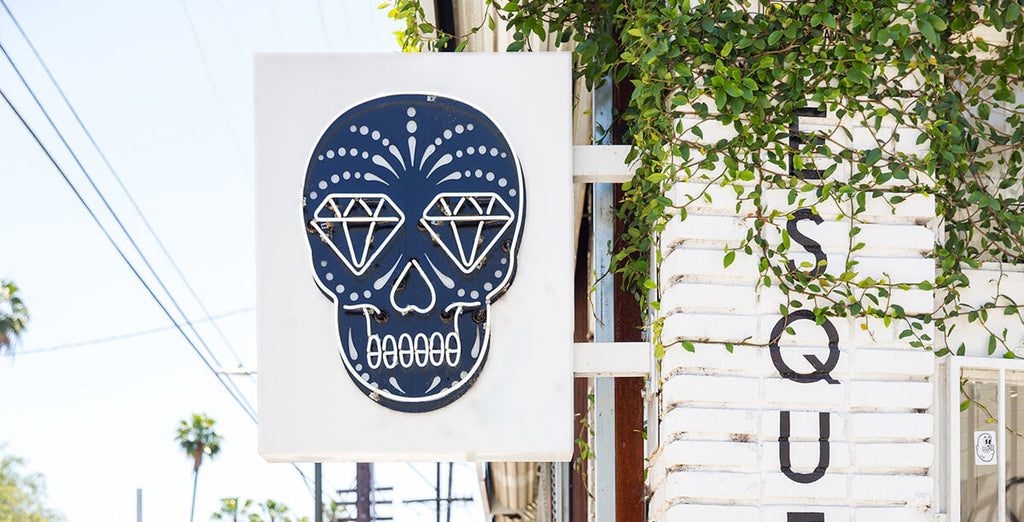ETHOS
ESQUELETO ETHOS
ESQUELETO translates to skeleton, which symbolizes a framework providing support for life. Our business itself is both a platform for a growing community of emerging and established artists, as well as a destination for mindful shoppers looking for designs reflective of their own originality. Balanced by an aesthetic that is at once organic and refined, our shop is curated with integrity of design and longevity in mind.

ETHICAL SOURCING
Investing in fine jewelry can be overwhelming, as the industry has roots in human rights atrocities and environmental degradation. Diamonds in particular have a long, complicated, and violent history. We acknowledge this, and are committed to driving change within the industry by working with artists and suppliers who share our commitment to social and environmental sustainability. All of the diamonds in our shop are conflict-free, meaning they are Kimberley Process compliant, and we use recycled metals whenever possible.
WHAT ARE CONFLICT DIAMONDS?
The last three decades have been extremely important in awakening the public to the socio-political concerns related to conflict resources, or resources harvested in “conflict” conditions.
Conflict diamonds, or blood diamonds, are rough diamonds used by rebel forces to fund civil wars, and overthrow internationally recognized governments. In the 1980’s, a report estimated that 20% of diamonds in the entire global marketplace were mined unethically. The extraction and exportation of conflict diamonds cost millions of lives in countries such as Angola, Ivory Coast and Sierra Leone–for years, a lethal blend of industry opacity and consumer ignorance supported the unregulated flow of conflict resources into the mainstream economy.
In the 1990’s, the UN appointed Canadian ambassador Richard Fowler to investigate the persistence of blood diamonds financing illegal, insurgent war efforts in Africa. The Fowler Report was published in 2000 and played a crucial role in laying the groundwork for new, ethical industry standards by naming the major players involved in the conflict diamond trade. Fowler’s work led directly to the UN Security Council Resolution 1295 and the Kimberley Process Certification Scheme.
WHAT IS THE KIMBERLEY PROCESS CERTIFICATION SCHEME?
The Kimberley Process Certification Scheme (KPCS) was established in 2003 to prevent conflict diamonds from entering the mainstream market. Today, 81 countries observe the process, which prohibits trade amongst member and non-member groups, and outlines procedures designed to limit access to conflict diamonds and resources. Although the KPCS is imperfect, it has proved valuable by shining a light on a global issue and acknowledging a burden shared by an entire industry, as well as providing the most comprehensive system for increasing collective accountability to date. In 2004, The World Diamond Council reported that the percentage of blood diamonds in the market had fallen to 1%, where it has since remained. Ultimately, the power is in the hands of consumers, who can steer industries towards sustainability simply by investing in (thus increasing the demand for) ethical goods and services provided by companies and brands guided by ethos in alignment with their own values.
OUR IMPACT
Sustainability is more than mere policy or procedure – it is our consistent commitment to better ourselves, empower each other, provide value for our clientele, and protect the Earth in the process. In an effort to avoid greenwashing, we want to be straight up with our customers – we are a small business, which means all of our decisions must be weighed carefully in order to minimize our footprint, maximize our impact, and maintain profitability. Fortunately, the high value of precious metals and stones creates a natural incentive to repurpose and recycle materials. We enjoy working with heirloom stones and recycled metals when creating custom pieces, ultimately giving new life to old pieces and saves the Earth from being mined for raw, new materials. We are open to feedback and suggestions on ways to minimize our footprint and maximize our impact.
LOCAL PRODUCTION STUDIO
We are headquartered in Oakland, California’s Temescal neighborhood. Our storefront, studio, and offices are all nestled within walking distance of each other. Localizing production helps us provide a better service for our local community by employing local makers and metalsmiths instead of outsourcing labor.
In our production studio–where we design, customize and repair our jewelry–microfiber towels are used instead of paper and all metal scraps are collected and recycled. We use natural liver of sulfur for oxidation (which can also fertilize your plants–fun fact) and citric acid for cleaning metals after heating. These are better, non-toxic, choices benefitting both the local water supply and our jewelers.
Imperfect diamonds in particular have been historically omitted from jewelry designs and would have ended up on the slag pile if not rescued, cast, and set in contemporary designs by modern, mindful jewelers. We are proud to offer a diverse selection of rustic diamonds and unique future heirlooms.
RECYCLED METALS
One third of the total gold supply is recycled. Economic stability actually directly correlates to lower levels of gold recycling, as struggling markets are more likely to “distress sell” valuable commodities such as precious metals and stones. We work with artists who are committed to sourcing responsibly regardless of the financial climate, and who use recycled metals as often as possible. Electronic waste poses a substantial challenge (or opportunity!) for the future of gold recycling, as the volume of industrial recycled gold (from waste electrical and electronic equipment) grows rapidly yet remains harder to extract. 
If you have any questions or recommendations regarding our ethos, please contact us at online@shopesqueleto.com


